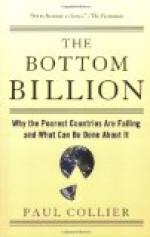Sometimes life is so unsatisfying that we think we should like to be rid of it. But we really are not longing for death; we are longing for more life.
Whatever crazy sorrow saith,
No life that breathes with human breath
Has ever truly longed for death.
’Tis life, whereof our
nerves are scant,
Oh life, not death, for which we pant;
More life, and fuller, that I want.
Alfred Tennyson.
THE UNMUSICAL SOLOIST
In any sort of athletic contest a man who individually is good—perhaps even of the very best—may be a poor member of the team because he wishes to do all the playing himself and will not co-operate with his fellows. Every coach knows how such a man hashes the game. The same thing is true in business or in anything else where many people work together; a really capable man often fails because he hogs the center of the stage and wants to be the whole show. To seek petty, immediate triumphs instead of earning and waiting for the big, silent approval of one’s own conscience and of those who understand, is a mark of inferiority. It is also a barrier to usefulness, for an egotistical man is necessarily selfish and a selfish man cannot co-operate.
Music hath charms—at least
it should;
Even a homely voice sounds good
That sings a cheerful, gladsome song
That shortens the way, however long.
A screechy fife, a bass drum’s beat
Is wonderful music to marching feet;
A scratchy fiddle or banjo’s thump
May tickle the toes till they want to
jump.
But one musician fills the air
With discords that jar folks everywhere.
A pity it is he ever was born—
The discordant fellow who toots his own
horn.
He gets in the front where all can see—
“Now turn the spot-light right on
me,”
He says, and sings in tones sonorous
His own sweet halleluiah chorus.
Refrain and verse are both the same—
The pronoun I or his own name.
He trumpets his worth with such windy
tooting
That louder it sounds than cowboys shooting.
This man’s a nuisance wherever he
goes,
For the world soon tires of the chap who
blows.
Whether mighty in station or hoer of corn,
Unwelcome’s the fellow who toots
his own horn.
The poorest woodchopper makes the most
sound;
A poor cook clatters the most pans around;
The rattling spoke carries least of the
load;
And jingling pennies pay little that’s
owed;
A rooster crows but lays no eggs;
A braggart blows but drives no pegs.
He works out of harmony with any team,
For others are skim milk and he is the
cream.
“The world,” so far as he
can see,
“Consists of a few other folks and
ME.”
He richly deserves to be held in scorn—
The ridiculous fellow who toots his own
horn.




